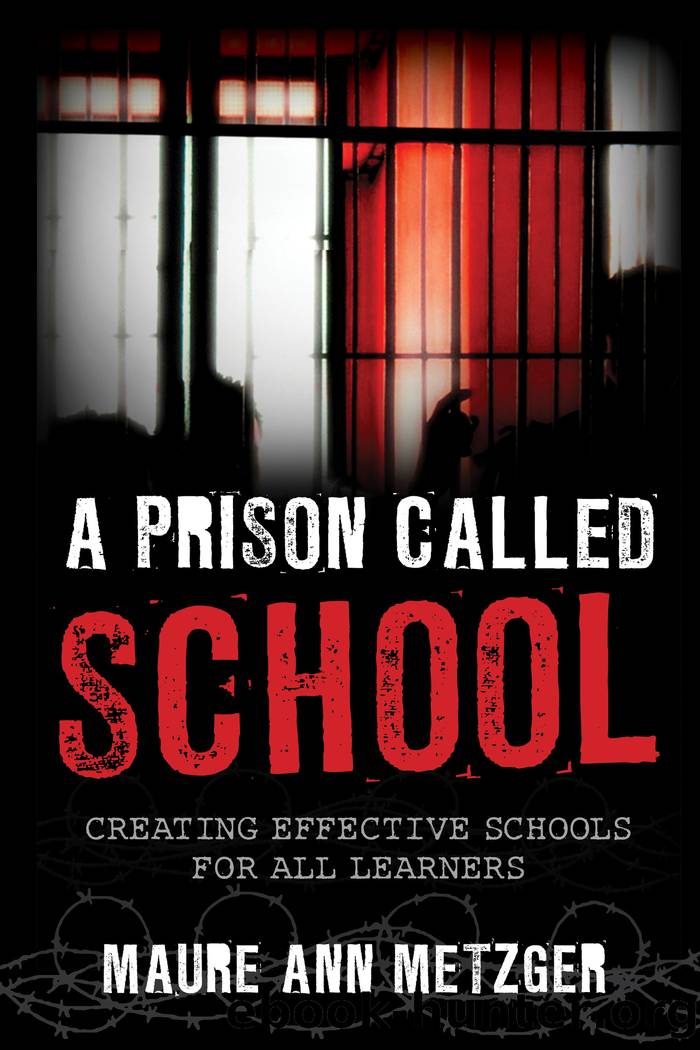A Prison Called School by Metzger Maure Ann;

Author:Metzger, Maure Ann;
Language: eng
Format: epub
Tags: undefined
Publisher: Rowman & Littlefield Publishers
Published: 2012-08-15T00:00:00+00:00
Empowerment
What does it take for students to move from being passive observers and recipients of knowledge to being active decision makers and architects of their lives? While valuing youth, as discussed in chapter 6, is critical for helping young people to build a positive sense of self and their importance as members of our schools and communities, it is not enough. Valuation must be accompanied by a sense of personal efficacy that is also connected to a larger, collective efficacy so that young people can see themselves as individuals and groups that matter.
Moving from a place of passivity to one of efficacy and agency does not happen easily for most young people in school settings. Although educators want students to be invested and responsible for their futures, schools provide few opportunities for students to practice the necessary skills and roles that help build a sense of mastery over oneâs life and future. The historical, institutional, and hierarchical nature of schools impedes the kind of empowerment that is essential for young people to build a much-needed sense of efficacy and agency.
So what is empowerment, and what does it mean for young people, especially within the school setting? Empowerment is a process that strengthens and activates an individual or groupâs capacity to satisfy their own needs, solve their own problems, and acquire the necessary resources to take control over their life.[1] It is a multidimensional social process that helps people to act on issues they define as important.[2] Relevant to youth, empowerment is defined as an attitudinal, structural, and cultural process whereby young people gain the ability, authority, and agency to make decisions and implement change in their own lives and the lives of other people.[3]
Empowerment does not just happen on its own. Certain conditions must prevail.[4] First, for empowerment to occur, power must be able to change. The fact that power is created within the context of a relationship between people or things makes it amenable to change. Second, the viability of empowerment depends upon the idea that power can expand, that it can be shared. People often associate power with control and domination. They perceive power as something that one person gains at the expense of another. But power can also be shared by, and mutually benefit, many people. This kind of power, ârelational power,â strengthens, rather than diminishes, the power of others. So if power is changeable and can be seen as something that is not finite, there is potential for empowerment.
Even if power is malleable and expandable, empowerment is not something all individuals or groups can easily attain. Groups that are either on the fringes of society or discriminated against often feel powerless. This is a result of being excluded from having a voice and decision-making capacity on issues that affect them. Young people are one such group. They are typically in one-down, authority-based relationships with adults who hold power over them. And when it comes to education, young people have little to no voice in the development
Download
This site does not store any files on its server. We only index and link to content provided by other sites. Please contact the content providers to delete copyright contents if any and email us, we'll remove relevant links or contents immediately.
Deep learning with TensorFlow and Keras by Derrick mwiti(902)
Understanding PDA Autism in Kids: A Guide for Parents and Teachers to Support Neurodiverse Learners by Jehu Len(837)
The Victorian Era: A Captivating Guide to the Life of Queen Victoria and an Era in the History of the United Kingdom Known for Its Hierarchy-Based Social Order by Captivating History(613)
Writing Solid Code: Development Philosophies for Writing Bug-Free Programs by Steve Maguire(534)
100 Ideas for Secondary Teachers: Engaging Parents by Janet Goodall & Kathryn Weston(511)
Intersectionality in Educational Research by Dannielle Joy Davis; James L. Olive; Rachelle J. Brunn-Bevel; Susan R. Jones(506)
How to be assertive in any situation by Hadfield Sue & Hasson Gill(500)
Brain Teasers to Build Critical Thinking Skills: Brain Exercises for Tech, Banking, Case Interview Prep, and to Keep Your Mind Sharp by Kris Safarova(487)
Brain Teasers to Build Critical Thinking Skills by Safarova Kris(483)
Python 101 - Fundamentals by Sam(452)
Critical Curriculum Leadership : A Framework for Progressive Education by Rose M. Ylimaki(445)
The Art of Emotional Validation: Improve Your Communication Skills and Transform Your Relationships by Validating Emotions and Feelings by Emily Wright(414)
A Beginner's Guide to SSD Firmware by Unknown(401)
The Knights Templar: An Enthralling History of the Rise and Fall of the Most Influential Catholic Military Order by Wellman Billy(400)
NumPy : From Basic to Advance by bisht Karan Singh(399)
Alma Maters (5th edition) by Unknown(390)
The Future Knowledge Compendium by Ellyard Peter;(389)
What Every Teacher Should Know about Learning, Memory, and the Brain by Tileston Donna E. Walker;(386)
Make wealth from intraday trading by Maddy MADDY(377)
